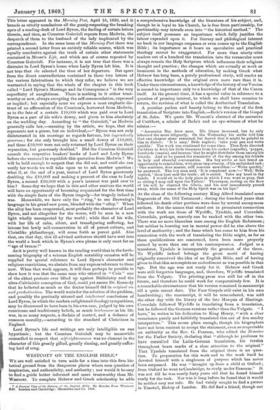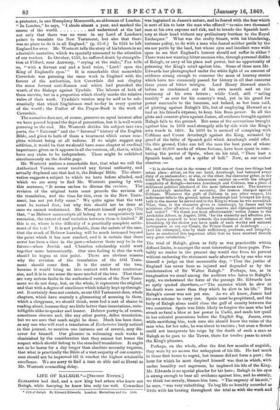WESTCOTT ON THE ENGLISH BIBLE.* WE are well satisfied to
turn aside for a time into this firm historical ground from the dangerous places where men question of inspiration, and authenticity, and authority ; nor would it be easy to find a guide better informed and more trustworthy than Mr. Westcott. To complete Hebrew and Greek scholarship he adds a comprehensive knowledge of the literature of his subject, and, though he is loyal to his Church, he is free from partizanship, for partizanship may intrude even into "the historical method." The subject itself possesses an importance which fully justifies the labour expended upon it. For literary and philological interest no book in our language surpasses or even comes up to the English Bible ; its importance as it bears on speculative and practical theology cannot be exaggerated. For more than ninety-nine readers out of a hundred the translation into the vernacular must always remain the Holy Scripture which influences their religious thought and practice ; the changes which are actually at work or imminent in the methods of education, by making Greek what Hebrew has long been, a purely professional study, will render an effective knowledge of the original even more rare than it is. Under these circumstances, a knowledge of the history of our Version is second in importance only to a knowledge of that of the Canon itself. At the present time, it has a special value in reference to a question of pressing interest, to which we shall have occasion to return, the revision of what is called the Authorized Translation.
A peculiar pathos and beauty belong to the story of the first translation of Scripture into English,—Bede's version of the Gospel of St. John. We quote Mr. Wescott's abstract of the narrative of Cuthbert, a scholar of Bede's and an eye-witness of what he relates :—
"Ascension Day drew near. His illness increased, but he only laboured the more diligently. On the Wednesday his scribe told him that one chapter alone remained, but feared that it might be painful to him to dictate. It is easy,' Bede replied ; take your pen and write quickly.' The work was continued for some time. Then Bade directed Cuthbert to fetch his little treasures from his casket (capsella), 'pepper, kerchiefs (onaria), and incense,' that he might distribute them among his friends. And so he passed the remainder of the day among his friends in holy and cheeiful conversation. His boy scribe at last found an opportunity to remind him, with pious importunity, of his unfinished task: ' One sentence, dear master, still remains unwritten.'—' Write quickly,' he answered. The boy soon said, It is completed now.'—' Well,' Bede
replied, 'thou haat said the truth ; all is ended. Take my head in thy hands. I would sit in the holy place in which I was wont to pray, that
so sitting I may call upon the Father.' Thereupon, resting on the floor of his cell, he chanted the Gloria, and his soul immediately passed away, while the name of the Holy Spirit was on his lips."
At the close of the following century King Alfred translated some fragments of the Old Testament ; during the hundred years that followed his death other portions were done by several anonymous authors. But the names that stand out in prominent connection with the work are those of Wycliffe, Tyndale, and Coverdale. Coverdale, perhaps, scarcely can be ranked with the other two. There was no more blameless man among the English Reformers ; but neither in learning nor in mental power did he rise above the level of mediocrity ; and the fame which has come to him from his connection with the work of translating the Bible might, as far as these qualifications are concerned, have been more properly earned by more than one of his contemporaries. Judged as a translator, Tyndale is incomparably the greatest of the three. To Wycliffe indeed belongs the great merit of having originally conceived the idea of an English Bible, and of having given to that idea as complete an embodiment as was possible in that age. But the age was not ready for it. Hebrew and Greek were still forgotten languages, and, therefore, Wycliffe translated from the Vulgate. The printing-press was still far off in the future, and therefore he could work for comparatively few. It is a remarkable circumstance that his version remained in manuscript till a quite recent date. The Four Gospels still exist in his own handwriting; the manuscript, it will be remembered, was sold the other day with the library of the late Marquis of Hastings. Coverdale followed Wycliffe in translating from a translation, but he followed the German versions rathcr than the Vulgate. "I have," he writes in his dedication to King Henry, "with a clear conscience purely and faithfully translated this out of five sundry interpreters." This seems plain enough, though his biographers have not been content to accept the statement, even so respectable an authority as the Rev. G. Pearson, who edited the Remains for the Parker Society, declaring that "although he professes to have consulted the Latin-German translation, his version throughout bears marks of a close attention to the original." That Tyndale translated from the original there is no question. 'lb preparation for this work and to the work itself he devoted himself with a singleness of purpose which has never been surpassed. He was "brought up from a child at Oxford ; from Oxford he went to Cambridge, to study under Erasmus." It was not till he was nearly forty years old that he found himself ready for the task. Nor was it long before he found that it would be neither easy nor safe. He had vainly sought to find a patron in Tunstall, Bishop of London. He did find a friend, though not
a protector, in one Humphrey Monmouth, an alderman of London. "In London," he says, "I abode almost a year, and marked the course of the world and understood at the last not only that there was no room in my Lord of London's palace to translate the New Testament, but also that there was no place to do it in all England." (p. 35-6.) In 1524 he left England for ever. Mr. Westcott tells the story of his labours in an admirable narrative, which we specially commend to the attention of our readers. In October, 1536, he suffered death by strangulation at Filford, near Antwerp, "crying at the stake," Fox tells us, "with a fervent zeal and a loud voice, Lord ! open the King of England's eyes.'" It is remarkable that meanwhile Coverdale was pursuing the same work in England with the favour of the authorities, but Coverdale did not display the same fervent anti-Roman zeal which had provoked the wrath of the Bishops against Tyndale. The labours of both of them survive, but in a proportion which clearly marks the relative value of their work. Tyndale's version may be said to be substantially that which Englishmen read to-day in every quarter of the world ; the Psalter of the Prayer-Book is the work of Coverdale.
The narrative does not, of course, preserve an equal interest after we have passed beyond the days of persecution, but it is well worth pursuing to the end. Mr. Westcott divides his subject into two parts, the " External " and the " Internal " history of the English Bible, and gives to both of them a treatment which seems complete without being at all tedious. If we might suggest any addition, it would be that we should have some chapter of cardinal importance given as it appears in all the versions, all, that is, which have any claim to be independent. These might be exhibited simultaneously on the double page.
Mr. Westcott notices a remarkable fact, that what we call the Authorized Version never received any formal authority, and actually displaced one that had it, the Bishops' Bible. The observation suggests a subject to which we have before alluded, and which we are sorry to find Mr. Westcott passing by with
this sentence, "It seems useless to discuss the revision. The revision of the original texts must precede the revision of the translation, and the time for this, even in the New Testament, has not yet fully come." We quite agree that the text must be revised first, but why this should not be done at once we cannot understand. Mr. Westcott himself says (p. 170) that, "as Hebrew manuscripts all belong to a comparatively late recension, the extent of real variation between them is limited." If this is so, where is the difficulty of a practically complete settlement of the text ? It is not probable, from the nature of the case, that the stock of Hebrew learning will be much increased beyond the point which it has now reached, and it is certain that there never has been a time in the past—whatever there may be in the future—when Jewish and Christian scholarship could work together more harmoniously. Our own feeling is that the work should be begun at this point. There are obvious reasons why the revision of the translation of the Old Testa ment should come first. It is the easier of the two, because it would bring us into contact with fewer controversies, and it is in one sense the more needed of the two. That there are very serious faults in the authorized version of the New Testament we do not deny, but, on the whole, it represents the original, and that with a degree of excellence which is fairly kept up throughout. It certainly does not contain, as our Old Testament does, whole chapters, which have scarcely a glimmering of meaning in them, which a clergyman, we should think, must feel a sort of shame in reading aloud, because they are little better than incantations, unintelligible alike to speaker and hearer. Hebrew poetry is, of course, sometimes obscure and, like any other poetry, defies translation, but we are sure that much might be done. Much has been done, as any one who will read a translation of Ecclesiastes lately noticed in this journal, to mention one instance out of several, may discover for himself. Our pleasure in welcoming such works is diminished by the consideration that they cannot but lessen the respect which should belong to the standard translation. It ought not to be borne for a day longer than absolute necessity requires, that what is practically the Bible of a vast majority of our countrymen should not be improved till it reaches the highest attainable excellence. We are sorry to find a 111all so able and so liberal as Mr. Westcott counselling delay.































 Previous page
Previous page